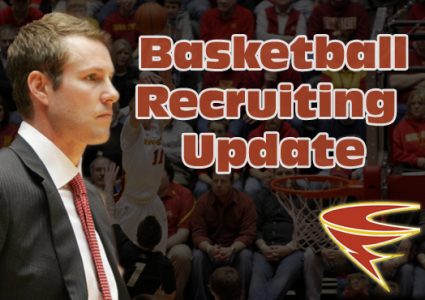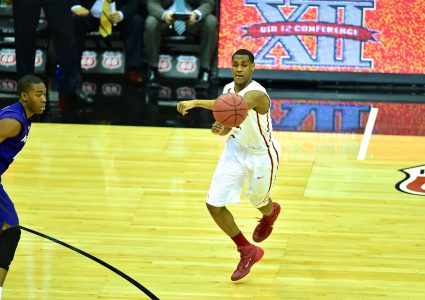AMES — As Tonya Morris’s boyfriend spoke, her son, Monté, absorbed every word.
Iowa State’s star point guard was nine at the time.
The man holding court in front of his house on Darryl Drive in Flint, Mich., delivered a powerful speech on basketball and life — a message that’s guided Monté Morris from his precocious youth to his proper perch among college basketball’s elite.
“He gave me a story and it turned out to be true,” said Morris, who is poised to shepherd the preseason top-10 Cyclones into the promised land known as “March Madness” again in the 2015-16 season.
Several gifted basketball players were assembled in front of the rollaway driveway hoop there on Darryl Drive. All were three or more years older than the NCAA record-setting assist-to-turnover wizard Morris, who nodded resolutely as the sermon unfolded.
Tonya Morris nodded, too. She knew great things would come for her only son — but he’d have to pursue them.
“Everybody out there could play,” she said. “I could have taken that whole group and made an AAU team and probably wiped out a lot of people. Everybody could play. And he was just out there, watching them and watching them. He just told them to come in here and talk.”
That fateful tale, spun from yarns of cold, hard, nothing-but-net truth, went something like this:
“He told us only one of us probably would be on this level,” said Morris, the most efficient point guard in NCAA history two years running. “And it happened to be me. He broke down everybody: ‘Everybody wants to go to the NBA. One of y’all’s going to go to jail and one of y’alls going to be there soon.’ And it all came out to be true and I was just blessed enough for me to take this path.”
In Flint, Michigan, one learns to rise, fall, then rise again. For decades, General Motors provided the community with a punch card to the middle class. When most of its factories closed in the 1980s and 1990s — with many jobs shipped elsewhere — a chasm developed. Flint’s one of America’s most impoverished cities. Bankrupt and crumbling, residents persevere. Crawling out isn’t easy. Morris, with his family’s help, quickly learned to paw his way up, then walk, run and sprint toward a glimmering future.
“He is a winner,” said first-year ISU coach Steve Prohm. “Those kids from Flint are tough.”
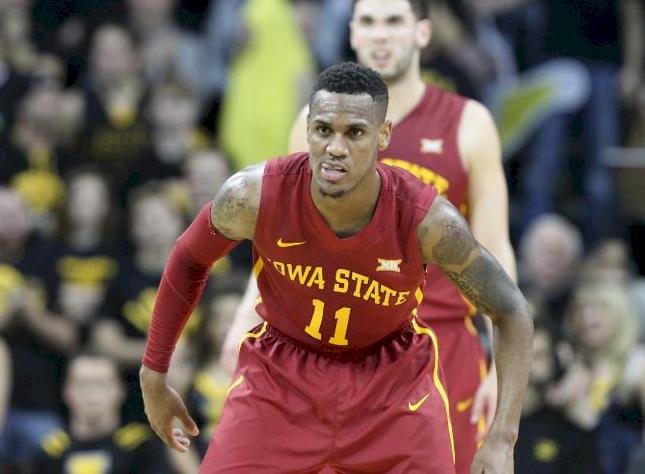
***
Morris always played with the older kids. He had to. Tonya coached girls’ basketball, and one day found Monté trying mightily to hoist the basketball in the layup line.
He was four — and this story’s been told before.
He could drive the lane, but pushing the basketball up on the glass proved too difficult a task at the time.
So a loving nickname was struck.
“I said he was just my little ‘Man-Man,’ Tonya Morris said. “I used to sing the song to him all the time when we were at home. I would sing that song for him if he was crying or something.”
The lullaby unfolded for a time before being shelved. Growing up, Morris rarely if ever misbehaved, or wavered from his soon-to-be chosen path as he stretched toward adulthood.
“He always had that plan of playing basketball,” Tonya Morris said. “He always wanted to go to a D-I college and he used to work hard at it. He never, ever not worked at it. His craft, it shows all day.”
Monté would wake up at 6 a.m. and go for a run. Daily. Sometimes twice. As friends lolled around during sun-kissed summer afternoons, he built up sweat.
“Monté would want to go to the gym and work on something,” Tonya said. “He’s just always been determined.”
By middle school, Morris had become a floor general on AAU teams surrounded by high schoolers.
By high school, he’d become a beacon of hope, eventually leading Flint Beecher to consecutive class C state titles. The Buccaneers struck gold again last March, and Morris watched with pride. He’s spoken to his former teams since graduating.
“When you talk to them and they tear up,” Morris said, “That’s when you know they’ve got the potential and they care.”
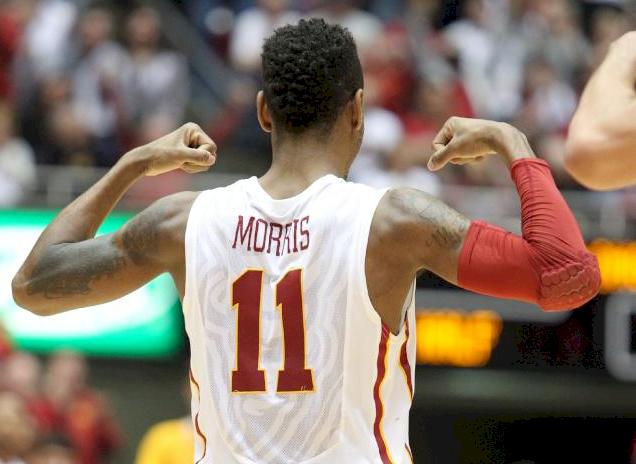
***
Morris almost didn’t come to Iowa State. He craved offers from Michigan State and Michigan that never came. No hard feelings. Spartans coach Tom Izzo is on the record as regretting the oversight.
“I wanted to commit to Michigan State when I was a sophomore or a freshman,” Morris said. “So if he wouldn’t have overlooked me, I definitely would have been a Michigan State Spartan.”
Morris let go of that wish long ago, though. He said he weighed about 140 pounds back then. He understands why he didn’t end up in East Lansing. Meant to be, more or less.
“Everything happens for a reason, too, because every time Izzo came to watch me play and he set me up at a Michigan State camp to play downstairs on the main floor, he sat courtside, and I never really played good in front of him,” Morris said. “I think that was another thing. Plus, it was my size. But look at me now.”
Still, Ames seemed a world away in more ways than one, especially for mom. The family felt a bond with then-assistant coach Cornell Mann and then-head coach Fred Hoiberg, but Iowa? Corn and hogs. What else was there?
“My son will never be a Cyclone,” Tonya Morris thought at the time.
She now laughs at her preconceptions.
“I absolutely fell in love with Iowa,” she said.
Morris always liked the tree-lined campus and small-town feel. His coaches and future teammates, too. He saw a program on the rise. A launching pad from which to prove doubters wrong and set dreams to take flight.
“If it’s meant to be, it will find it’s way back somehow,” he said.
Fast forward to November 11, 2013. Morris’s first career game as a Cyclone. He finished with four assists and three turnovers against outmanned UNC-Wilmington. He’s had that many or more turnovers twice in the 66 games since.
“Time flies,” said Morris, whose career assist-to-turnover ratio is an eye-popping 4.7. “My body done changed two years ago. I’m just at a loss for words.”
***
Morris met DeAndre Kane as a thin, wiry freshman.
Kane was built. He’d been through the grind. The transfer from Marshall had one last chance at team success in college and helped guide the Cyclones into the Sweet 16.
Morris watched, learned and helped — and sometimes took sharp elbows from his muscled mentor.
Flint and the “Buc-Town” area had toughened him up. Kane pushed him to an entirely different level.
“He took me from being mediocre to being a good college player,” said Morris, who is widely and properly considered to be one of the nation’s top five point guards. “I give all my credit to him.”
But …
“I know I pushed him, too,” Morris said. “I pushed him, too. I might not have been able to bang with him like Marcus Smart could, but I pushed DeAndre. I did some things better than him and he knows that. And he did some things better than me. That’s how we were able to play off each other and that’s why we respect each other’s game’s so much.”
Now all that’s left for Morris’s game is adding a finishing touch. He’ll be asked to score more this season after shooting 51 percent from the field as a sophomore. It’s not a new task. Before becoming the dazzling distributor at ISU, he carried teams at Beecher and in AAU ball by getting to the rim and burying shots from deep.
“We definitely want Monte to be more aggressive and create more for himself other than others,” said the Cyclones’ preseason first team All-American, Georges Niang. “He’s obviously a great point guard and does a great job of getting all of us involved, but I think to help this team go forward he’s going to have to be more aggressive and look for his shot. And as he does that I think it will open up a lot more for the rest of us.”
Morris smiles when asked about the next stage of his development. It’s already there. Waiting.
“When you’re playing with a helluva player like Jameel (McKay), Georges — that’s stuff you can’t teach,” Morris said. “Naz (Mitrou-Long), shooting the ball great. I’ll be in chill mode a lot. I’ll score when I need to. People say, ‘Oh, he can’t shoot it.’ I shot 40 (percent) both years from three. ‘He can’t score the ball here, he can’t do this,’ but honestly, if you watch us play pick up, when I want to score the ball I score the ball. I’ve just got great players surrounding me.”
Fast forward to March 12, 2015. Morris drives toward the corner, the Cyclones down in the first round of the Big 12 Tournament against Texas (photograph below). The 6-3, 175-pounder rises up. Swish. ISU survives, celebrates and eventually wins the conference tournament for the second year in a row.
He’d previously drained the game-tying 3-pointer and finished with a career-high 24 points and five steals, but the best, he said, is yet to come.
“I’m getting credit for being OK and I know I can take my bar two or three levels up,” Morris said. “I’m ready to showcase that this season. We should be in a good position because I’ve got a lot left that I haven’t shown.”
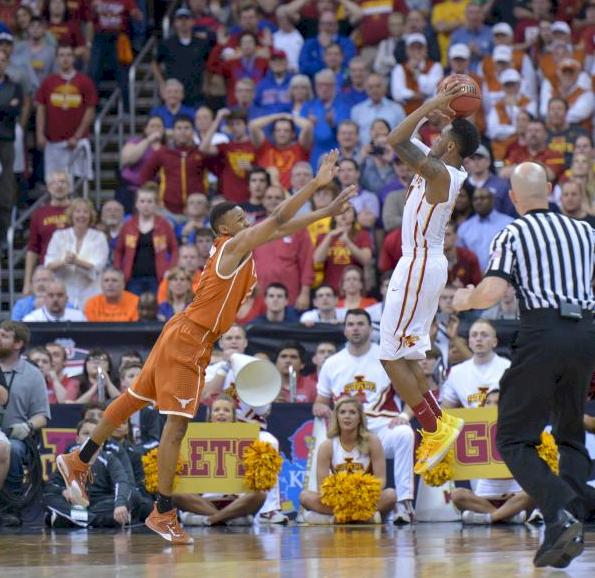
***
Morris may or may not leave for the NBA after this junior season.
To some, it’s a foregone conclusion. For him, there’s unfinished business that needs finishing.
“When you get that in your head you start playing hesitant,” Morris said. “NBA in your head, you’re like, ‘There’s that Minnesota scout over there, I missed a shot. Man.’ So I’m just going out there and playing basketball and when God’s ready for me to take that leap, whether that’s me this year or next year, or me going undrafted and taking a D-league route then getting in the NBA, it’s going to happen, regardless. If I play a great year, God let me know it’s my time and we’re going to go from there. My biggest thing is winning. This year, if I could take us going to the Final Four and I would only average eight points a game, I would be happy. Nowadays, it’s about winning.”
Always has been. All the way back to that important post-pick up talk on Darryl Drive.
Morris tapped his resolve. Mom saw it happen. Nothing would deter him from greatness — from being that one guy who rose above all too common circumstances in Flint.
“I tell him all the time that he inspires me, because he’s just a great person,” Tonya Morris said. "And I know a lot of moms say that, but he is. He’s absolutely wonderful.”
Monté says his mom, a single parent, sacrificed a lot for him. He’s never known a father. Even that boyfriend who spoke those fateful words didn’t become family. His mom and his grandmother, who passed away from cancer a day after his 20th birthday in June, are his rocks.
“I always tell myself, coming from Flint, it always could be worse,” Morris said. “Whether that was me failing a test, me losing a game, me missing the game-winning shot, me turning the ball over, it always could be worse. I don’t have a father and I just lost my grandmom. But I look at the positives. They’re in a better place, but it can be worse: I couldn’t have my mom. I always take the bad with the good and the good with the bad.”
Always makes it better, too.
Love comes in many forms and spans generations. Man-man is now “Big Game” on Twitter. Tonya Morris knows and accepts this, but won’t fully dignify the label that was forged during a deep post-hoops talk.
“I don’t call him ‘Big Game,’” she said, laughing.
That’s because there’s simply no need to call him anything beyond Prohm’s description: Winner.
That former nine-year-old kid who stepped up and stood out and attended an all-class Beecher reunion a while ago, where that sagacious speech was relived.
Tears flowed. Dreams gathered intensity. Life simply went on.
“I’m doing this for more than me and just my family, I’m doing this for everyone at that reunion,” Morris said. “You’ve just got to stay grateful and stay humble.”



